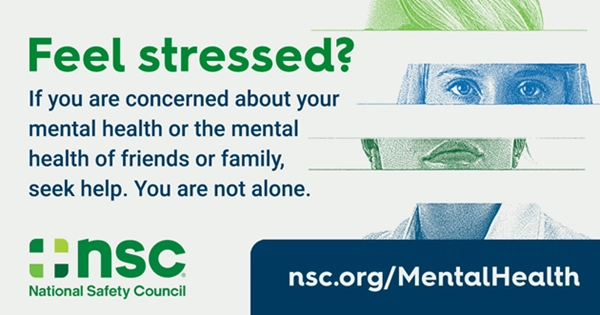Each year, the National Safety Council (NSC) promotes June as National Safety Month. Now, more than ever, safety is crucial both at work and at home.

This year, NSC will discuss one of these topics each week throughout June:
- Mental Health
- Ergonomics
- Building a Safety Culture
- Driving
Week 1 will focus on Mental Health.
The following are excerpts from an article written by Susan Vargas titled …
‘It’s not an easy conversation’: Mental health in the workplace
Why is mental health relevant?
Many people making the case for attention to mental health in the workplace cite the need to look at workers’ health and safety more holistically, addressing not only physical welfare but mental and emotional well-being as well.
“It really is a win-win for the organization and the worker when you invest in the well-being of workers more comprehensively,” said L. Casey Chosewood, director of the Office for Total Worker Health at NIOSH. “The best companies invest in the health and well-being of their workers throughout the day. Workers bring that additional health back to the job the next morning in the form of increased productivity, decreased injury and illness risk, decreased health care spending, and more engagement with their work.”
Those who agree add that addressing the matter is necessary because:
- Mental health concerns are both common and long-lasting.
- Mental health affects worker productivity and the bottom line.
- Workplace stress contributes to poor physical and mental outcomes.
- Mental health can affect worker safety.
“The mind drives the activity of the body,” said Larry Masotti, director of strategic relationships for Workplace Safety & Prevention Services, a Mississauga, Ontario-based workplace health and safety association. “We’ve seen movements all around the world on mindfulness – people being aware of what they’re doing and present in the moment. To work safely, people need to be mindful of what they’re doing, and that’s part of the conversation on mental health.”
Safety still comes first
Even those in favor of addressing mental health agree that prevention of physical injury should remain the top priority.
“It’s not an easy conversation,” Masotti said. “People are busy protecting themselves, not wanting to talk about certain things because they’re worried about being isolated or singled out. Ideally, we’re trying to create an environment where people are open to talking about mental health.”
You may access the entire article by clicking here.
The National Safety Council is the nation’s leading non-profit safety advocate and focuses on saving lives and preventing injuries, from the workplace to anyplace. You may become a member of NSC and/or learn more by visiting www.nsc.org.




